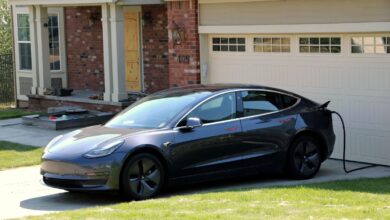Globe editorial: Do not merge with U.S. tariffs on Chinese EVs

The United States, the world’s foremost economy and a military superpower, is terrified of Seagulls.
Not the ubiquitous seabird but, rather, the compact electric vehicle produced by Chinese carmaker BYD that has a driving range of more than 400 kilometres and a price tag of around US$10,000 in China, less than half that of the cheapest EV available in the U.S.
To keep Seagulls off American roads, President Joe Biden raised the tariff on Chinese EV imports to 100 per cent from 25 per cent earlier this month – a stark admission that U.S. automakers can’t compete, and an acknowledgment that the huge subsidies Washington is heaping on cleantech companies are more about protecting jobs than speeding the adoption of emissions-reducing technology.
Canada is considering whether to follow suit. Doing so would be a mistake for a country whose prosperity hinges on open international trade.
Raising tariffs on Chinese EVs would hurt Canadian consumers, invite retaliation and sideswipe Ottawa’s goal of having 100 per cent of new vehicle sales be zero-emission by 2035. In contrast to the U.S., which imports almost no Chinese-made EVs right now, Canada already brings in a significant number of Teslas that are manufactured in Shanghai.
More important, Canada depends on the rules-based order that was carefully constructed over decades but is crumbling today as Washington and Beijing go tit-for-tat with tariffs and industrial policy. Canadians should be fighting to uphold this system, not helping to weaken it.
There’s no doubt that BYD and other Chinese automakers pose a threat to incumbents in North America, Europe and Asia. They’re outcompeting on cost, owing to cheap labour, efficient supply chains and subsidies from the Chinese government – the last of which is the subject of an anti-competition investigation by the European Union. Chinese EVs are gobbling up market share in every country they’ve entered.
This strikes fear into the heart of Canadian auto-industry lobbyists and politicians from manufacturing regions such as Southwestern Ontario.
But consumers stand to benefit from lower-priced imports, as well as the better and cheaper products North American manufacturers will need to produce to remain competitive. And when it comes to the widespread adoption of EVs, falling prices aren’t just nice to have. They’re essential.
The average price for a new electric vehicle in Canada was around $70,000 last year, and EVs made up around 10 per cent of new car sales. If EVs are to become more than a status symbol for wealthy progressives or Elon Musk superfans, prices need to drop sharply. A study from Bank of Nova Scotia last year estimated they would need to fall by at least a third to be affordable for the average Canadian household.
Of course, tariffs are tempting for politicians. They get to wrap themselves in the flag and talk about saving manufacturing jobs. And having promised foreign automakers – including Volkswagen, Stellantis and Honda – some $50-billion worth of taxpayer money to set up EV factories in Canada, the federal government and its provincial partners may be inclined to build walls around their “investments.”
But one foolhardy decision shouldn’t tempt a government into making another. Any benefit that might come from using tariffs to protect auto jobs in Southern Ontario would be paid for many times over by consumers and other industries hit with retaliatory measures.
Still, Canada should not be naive about the Chinese auto industry. China has never played by international trade rules, and a macroeconomic imbalance at the heart of its economy – consumers save too much and spend too little – means the country could look to vehicle exports to drive growth.
If China tries to dump cars into the Canadian market, selling them for less than they’re sold domestically, Canada should respond with countervailing duties. And Canadian policy makers should not be shy to call out and investigate unfair practices, as the European Union is doing right now.
But this should happen within the context of World Trade Organization rules, brittle as that institution is today, rather than on a unilateral basis, as is case with the U.S.
The U.S. is turning increasingly inward. Mr. Biden and former president Donald Trump are trying to outcompete each other on protectionist rhetoric ahead of the fall election. Canada should not play that ultimately destructive game.



